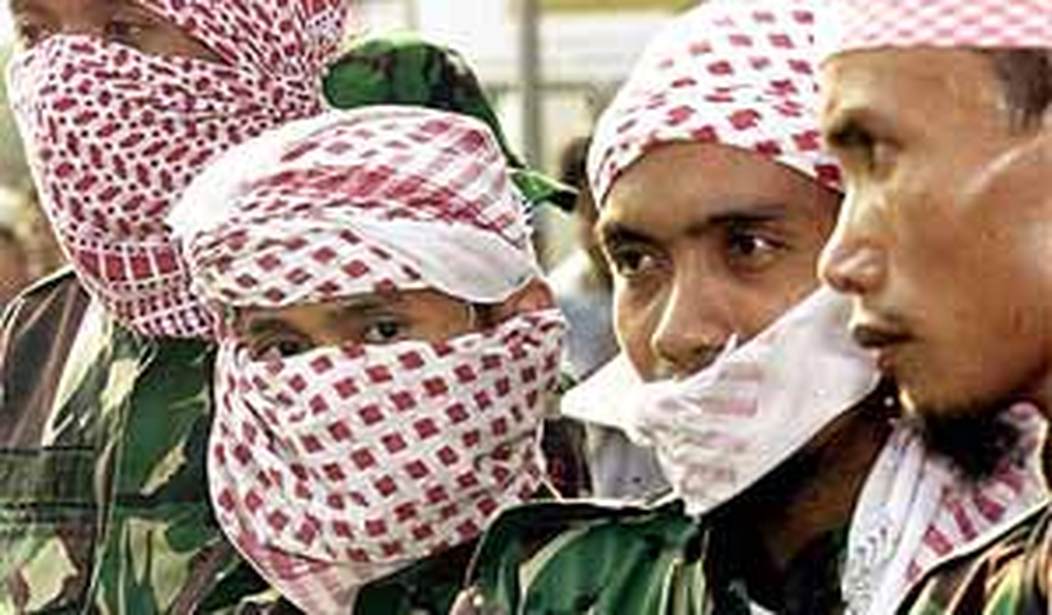WASHINGTON — An Indonesian terrorist organization that a senior defense official said this week posed a “serious transnational threat” has previously been caught planning hijackings in the region where Malaysian Airlines Flight MH370 disappeared.
U.S. military assets participating in the search and recovery efforts confirmed they were asked to relocate to the west side of Indonesia in the Indian Ocean as pings indicated the plane turned away from its route to China and turned back over the Malaysian peninsula. ABC News also reported Thursday that the data-reporting system on the flight shut down before the transponder, from 1:07 a.m.to 1:21 a.m., raising suspicions that the plane was at the hands of someone nefarious.
Jemaah Islamiyah has long had designs on roping Malaysia and the Philippines into an Islamist state along with Indonesia, and was designated a foreign terrorist organization by the U.S. government after the 2002 Bali nightclub bombing. The group has traditionally used Malaysia for fundraising and as a home base for trainees fresh from the Af-Pak region.
JI plotter Mas Selamat Kastari, who escaped from custody in Singapore in 2008 and was recaptured in Malaysia the following year, was accused of orchestrating a plot earlier in the decade to hijack a plane out of Bangkok’s airport and crash it into Singapore’s airport.
Jemaah Islamiyah had been considered a shadow of its former self in recent years, but the terror group’s name has been occasionally dropped on Capitol Hill as a jihadi movement getting a new lease on life in a post-Osama world.
“Indonesians are the first — are for the first time going overseas to fight, not just to train, which has given rise to concerns that this conflict may breathe new life into the group Jemaah Islamiyah, which analysts previously considered to be moribund,” Daveed Gartenstein-Ross, senior fellow at the Foundation for the Defense of Democracies, told the Senate Foreign Relations Committee at a Syria hearing last week.
Assistant Secretary of Defense for Special Operations/Low-Intensity Conflict Michael D. Lumpkin told the Senate Armed Services Committee on Tuesday that “a task force of about 500 special operators and supporting general purpose forces” helped the Philippines battle “a serious transnational terrorist threat from Abu Sayyef and Jemaah Islamiyah.”
In a House Homeland Security Committee hearing last summer after the Boston Marathon bombings, Bruce Hoffman, director of the Center for Security at Georgetown University, testified that “the continued fragmentation of the jihadi movement as a result of bin Laden’s killing and core al-Qaeda’s weakening may paradoxically present new and daunting challenges to both regional and Western intelligence and security services.”
“The continual emergence of new, smaller, more dispersed terrorist entities with a more fluid membership that easily gravitates between and among groups that have little or no established modus operandi will raise difficulties in terms of identifying, tracking, anticipating and predicting threats,” Hoffman said, using as example close al-Qaeda ally Jemaah Islamiyah’s “splintering into smaller, more numerous lashkars or militias that have proven difficult to identify and track.”
Hoffman also warned that the leaders rising up after much-vaunted killings or arrests of terror leaders “have shown themselves to be more lethally violent than their predecessors,” making for an “unnerving” task in dealing with next generation al-Qaeda and its global network of skillfully metastasized allies.
One of those active Indonesian splinter groups, Jamaah Ansharut Tauhid, is led by radical cleric Abu Bakar Baasyir, the longtime spiritual head of Jemaah Islamiyah.
His words are published on the group’s website, including a Monday message to mujahideen volunteering in Syria.
“My brother, the days that you will encounter will be increasingly severe,” Baasyir wrote, telling them to “rest assured” that their path is correct. He extensively quotes from the Quran in the message: “Allah inflicted disaster to those who disbelieve, and thus vengeance to those who disbelieve.”
A 2008 Guantanamo detainee assessment of Jemaah Islamiyah mastermind Hambali, arrested in Thailand in 2003, said he had once weighed the use of helicopters to get around security perimeters and attack the U.S. Embassy in Jakarta. He also sent an operative to buy Russian-made surface-to-air missiles in Cambodia to target El Al flights out of the Bangkok airport.
Jemaah Islamiyah was working with Osama bin-Laden to launch a coordinated strike on 9/11/01 that would hijack and crash planes at the same time as the attacks on the U.S. The Gitmo document says bin Laden found this too difficult to synchronize so he dropped the southeast Asian part of the plan; operatives involved had been mapping out locations of U.S. carriers in the area and staying in Kuala Lumpur during parts of the plotting.
As far back as 1995, Hambali planned to bomb 11 U.S. airliners in southeast Asia. He also explored biological weapons programs and met with current al-Qaeda leader Ayman al-Zawahiri about bioweapons in Kandahar in 2001.
In 2006, Zawahiri released a video announcing that Jemaah Islamiyah and al-Qaeda were, from that point forward, “one line” as strategic and ideological partners facing a mutual enemy.









Join the conversation as a VIP Member